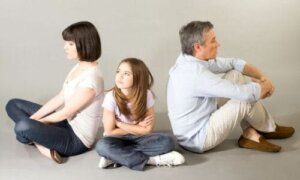The Impact of Parental Separation on Only Children


Written and verified by the psychologist Sharon Capeluto
When there’s a family, the impact of parental separation doesn’t just affect each partner, but also the children. However, it’s usually a wise decision that brings positive long-term consequences.
We know that, in most cases, parental divorce doesn’t occur without leaving a share of sadness and stress in the children when they’re young. A breakup is an event that generates a grieving process, both for the couple and at the family level. Every separation implies a loss. Things change, and each member is forced to readapt their life.
However, the impact of parental separation can be different when you’re an only child. The absence of a peer with whom to share this significant experience is noticeable.
Separation is a difficult decision to make
There are many aspects that are taken into account when making the difficult decision to end a bond. Sometimes, it’s clear that the couple’s relationship is no longer a source of satisfaction and well-being for either party. In this case, a mutual agreement is reached. But many other times, this process leads to conflicts, disagreements, and a host of unhealthy dynamics.
The situation becomes more complex when children are involved. In these cases, many questions arise that produce even more confusion: Do the children need us together? How will our decision affect them? How should we transmit it to them? How will they adapt to the new reality?

The impact of parental separation on only children?
Only children can be very diverse from one another. The personality and life experience of a child without siblings may be considerably different from those of another child in the same situation. However, there are certain traits that may be present in most of them simply because they grow up without a companion at home:
- Self-demanding
- Creativity
- Autonomy and independence
- Feelings of loneliness
- Egocentrism
- Introversion
The following are some of the possible effects on only children as a consequence of the separation of their parents.
Feelings of loneliness
Not having siblings going through the same experience of family loss, only children may feel more lonely after the separation of their parents. Although they may have close and intimate friendships, they may feel a sense of emptiness because they don’t share this situation with other family members.
At times, they may even feel guilty about the separation, as well as sadness, anger, and frustration. On an emotional level, children will go through different intense states that are typical of the grieving process involved in any loss.
Anxiety and stress
Parental divorce is a stressful situation for children, whether they’re only children or not. It’s a significant event that changes the rules of the game. The fact that the parents are no longer together will inevitably lead to changes in routine and lifestyle.
This new context and the uncertainty of the future generate a certain degree of anxiety in children. In turn, they may have many unanswered questions such as who they’ll stay with, where they’ll live, when and where they’ll see each of their parents, and what their life will be like in the future. In addition, due to the absence of a peer, the feeling of stress may be intensified.

Difficulties with adjustment
After the separation, the family dynamics are transformed. In the future, a blended family may be established. This will require a period of adaptation for each member. In any case, the children have to acclimatize to their new life.
For example, there will be small changes in aspects of everyday life and others that are more significant and noticeable. Often, they’ll experience goodbyes and reencounters with each of their parents. Also, there may be no more threesome outings and they may have to move to a new house or sleep some nights in one home or and other nights in another.
“As the family unit acts as a support and protection for children, the breakdown of this structure triggers a period of disorganization and changes in the child’s life”.
– Salvador, G. P., & Del Barrio, V. –
There’s no universal answer
When we talk about human beings and the bonds between them, there’s no sense in making generalizations. Every family is unique, so every significant event within it will be as well. It’s true that parental separation represents an important event in children that can entail a great deal of pain at the beginning. However, it’s essential to know that children don’t need their parents to be together; they need them to be happy.
Regarding the impact that separation can have on only children, it’s important to pay special attention. Parents must accompany them in this process and keep in mind that, as they don’t have a peer with whom to share this experience emotionally, they may feel more lonely than usual.
When there’s a family, the impact of parental separation doesn’t just affect each partner, but also the children. However, it’s usually a wise decision that brings positive long-term consequences.
We know that, in most cases, parental divorce doesn’t occur without leaving a share of sadness and stress in the children when they’re young. A breakup is an event that generates a grieving process, both for the couple and at the family level. Every separation implies a loss. Things change, and each member is forced to readapt their life.
However, the impact of parental separation can be different when you’re an only child. The absence of a peer with whom to share this significant experience is noticeable.
Separation is a difficult decision to make
There are many aspects that are taken into account when making the difficult decision to end a bond. Sometimes, it’s clear that the couple’s relationship is no longer a source of satisfaction and well-being for either party. In this case, a mutual agreement is reached. But many other times, this process leads to conflicts, disagreements, and a host of unhealthy dynamics.
The situation becomes more complex when children are involved. In these cases, many questions arise that produce even more confusion: Do the children need us together? How will our decision affect them? How should we transmit it to them? How will they adapt to the new reality?

The impact of parental separation on only children?
Only children can be very diverse from one another. The personality and life experience of a child without siblings may be considerably different from those of another child in the same situation. However, there are certain traits that may be present in most of them simply because they grow up without a companion at home:
- Self-demanding
- Creativity
- Autonomy and independence
- Feelings of loneliness
- Egocentrism
- Introversion
The following are some of the possible effects on only children as a consequence of the separation of their parents.
Feelings of loneliness
Not having siblings going through the same experience of family loss, only children may feel more lonely after the separation of their parents. Although they may have close and intimate friendships, they may feel a sense of emptiness because they don’t share this situation with other family members.
At times, they may even feel guilty about the separation, as well as sadness, anger, and frustration. On an emotional level, children will go through different intense states that are typical of the grieving process involved in any loss.
Anxiety and stress
Parental divorce is a stressful situation for children, whether they’re only children or not. It’s a significant event that changes the rules of the game. The fact that the parents are no longer together will inevitably lead to changes in routine and lifestyle.
This new context and the uncertainty of the future generate a certain degree of anxiety in children. In turn, they may have many unanswered questions such as who they’ll stay with, where they’ll live, when and where they’ll see each of their parents, and what their life will be like in the future. In addition, due to the absence of a peer, the feeling of stress may be intensified.

Difficulties with adjustment
After the separation, the family dynamics are transformed. In the future, a blended family may be established. This will require a period of adaptation for each member. In any case, the children have to acclimatize to their new life.
For example, there will be small changes in aspects of everyday life and others that are more significant and noticeable. Often, they’ll experience goodbyes and reencounters with each of their parents. Also, there may be no more threesome outings and they may have to move to a new house or sleep some nights in one home or and other nights in another.
“As the family unit acts as a support and protection for children, the breakdown of this structure triggers a period of disorganization and changes in the child’s life”.
– Salvador, G. P., & Del Barrio, V. –
There’s no universal answer
When we talk about human beings and the bonds between them, there’s no sense in making generalizations. Every family is unique, so every significant event within it will be as well. It’s true that parental separation represents an important event in children that can entail a great deal of pain at the beginning. However, it’s essential to know that children don’t need their parents to be together; they need them to be happy.
Regarding the impact that separation can have on only children, it’s important to pay special attention. Parents must accompany them in this process and keep in mind that, as they don’t have a peer with whom to share this experience emotionally, they may feel more lonely than usual.
All cited sources were thoroughly reviewed by our team to ensure their quality, reliability, currency, and validity. The bibliography of this article was considered reliable and of academic or scientific accuracy.
- Narváez Matheus, R. E. (2003). Rasgos psicológicos del hijo único adolescente de 12 a 15 años (Bachelor’s thesis).
- Salvador, G. P., & Del Barrio, V. (1995). El efecto del divorcio sobre la ansiedad de los hijos. Psicothema, 7(3), 489-497. https://www.redalyc.org/pdf/727/72707302.pdf
- Testor, C. P., Pujol, M. D., Vidal, C. V., & Alegret, I. A. (2009). El divorcio: una aproximación psicológica. Universidad Ramon Llull, 2, 39-46. https://www.researchgate.net/profile/Carles_Testor/publication/242775375_El_divorcio_una_aproximacion_psicologica/links/54e43ae50cf282dbed6ea7ba/El-divorcio-una-aproximacion-psicologica.pdf
- Villalobos, C. D. A., & Mondragón, L. E. C. (2017). Autoconcepto y habilidades sociales en niños como hijos únicos y niños con hermanos. PsicoEducativa: reflexiones y propuestas, 3(5), 38-44. https://psicoeducativa.edusol.info/index.php/rpsicoedu/article/view/64
This text is provided for informational purposes only and does not replace consultation with a professional. If in doubt, consult your specialist.








